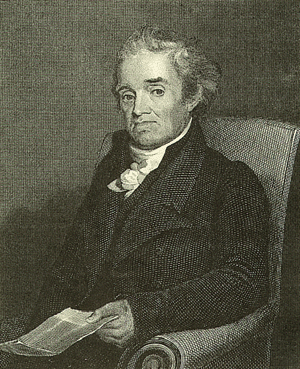
Noah Webster
If you’re a normal person, you’ve likely done a double take some time in the last year as your eye rested on a news headline so crazy – even in this unbelievably chaotic world of ours – that you couldn’t believe it. Evidence that such craziness is now a common occurrence shows itself in the popularity of news sites such as “Not the Bee,” whose tagline is “your source for headlines that should be satire, but aren’t.”
But there are still some normal headlines out there that also cause us to do mental double takes, largely because they run completely opposite this trend by offering unbelievably positive news. Such was the case when I came across a Wall Street Journal headline proclaiming, “Sales of Bibles Are Booming.”
The article largely attributed these booming Bible sales to the heightened marketing tactics of Christian booksellers. But it also acknowledged that some seismic cultural factors may be playing a role in the 22 percent increase in U.S. Bible sales this year. In fact, as I read those quoted in the article – everyone from a social media influencer to a Nevada mother – I began realizing that they were all citing three main reasons for their renewed interest in the Bible, namely, a search for stability, meaning, and happiness.
I could offer my own theories on why so many Americans are turning to the Bible seeking these three components of life, but I’d prefer to hear the opinions of someone far wiser than myself for insight into this cultural phenomenon. Thankfully, I found such an individual in Noah Webster, who, although not an American founder per se, strongly influenced founders such as George Washington, while also laying the groundwork for education in our nation.
In 1834, Webster wrote a book entitled, “Value of the Bible and Excellence of the Christian Religion.” Towards the end of this book, which marches through the biblical text offering brief commentary on key passages, Webster provides some thoughts on why the Bible is so key to human well-being. Ironically, his answers go hand-in-hand with the reasons the Wall Street Journal implies are causing the surge in Bible sales.
~ Stability ~
The quest for stability was something that popped up continually in the Wall Street Journal article, articulated most clearly by Amy Simpson, the Bible publisher at Tyndale House Publishers. “You have a generation that wants to find things that feel more solid,” Simpson explained. The article goes on to explain that the election and other recent geopolitical upheavals are likely what’s driving this feeling of instability.
Those looking for governmental guidance in the Bible are barking up the right tree, according to Webster:
As the will of God is our only rule of action, and that will can be fully known only from revelation, the Bible must be considered as the great source of all the truths by which men are to be guided in government, as well as in all social transactions. [Emphasis added.]
Such revelation helps the reader get to know God and develop a mindset in tune with his:
The first and most important duty of man is to furnish his mind with correct notions respecting God, his laws, and human duty; and then to exert his faculties, and direct his knowledge to the benevolent design of making others wiser and better.
Essentially, when we ingest God’s wisdom, thinking his thoughts after Him, we have something solid on which to base our lives. And this knowledge overflows into the decisions that we make for ourselves and others, providing a source of guidance and direction when we don’t know which way to turn.
~ Meaning ~
“I felt something was missing,” the Wall Street Journal article continues, quoting 28-year-old influencer Cely Vazquez on her recent purchase of a Bible. “It’s a combination of where we are in the world, general anxiety and the sense that meaning and comfort can be found in the Bible.”
A lack of stability naturally leads to unrest, and with unrest comes the desire to improve oneself and have meaning and purpose in life. Undoubtedly, this is why the self-help movement has grown so massive in recent years.
Webster, however, tells us that meaning in life is not found in trying to improve ourselves on our own; instead, it is found in patterning our lives after God and his character – a character clearly evident in the Bible:
“The doctrines and precepts recorded in the scriptures all tend to the same point, that of displaying the character of God, and exalting the character of man by bringing it to a conformity with that of God,” he writes.
“Equally effectual are the scriptures in refining our ideas, by representations of the purity and holiness of God,” he continues. “The more we know of God, the more just will be our conceptions of what is ennobling in our own conduct; and every step we take in imitating his perfections is an advance in elevation of character.”
~ Happiness ~
Having a sense of meaning and purpose in life goes hand-in-hand with happiness, and a lack of that latter trait may be the third reason people are turning to the Bible. Amber Cimiotti, a mother in her mid-30s, indicates to the Wall Street Journal that she has been unsuccessful in finding happiness, even though she did her best to pursue it by attending to “self-care, staying healthy and pursuing a career.”
Yet as Webster explains once again, happiness is not found in serving ourselves; rather, it is a side effect of seeking God:
As in the physical world, God has made every thing in the best manner to accommodate the human race, and every thing is adapted to that end; so in the moral world, every thing ordained by God is adapted to promote intellectual and religious improvement, and secure to men the greatest happiness of which they are susceptible in their present state of existence. [Emphasis added.]
Many may look at this recent headline from the Wall Street Journal and scoff, saying, “Wow, we really are at the end of our ropes if so many are turning to an old book for help and meaning in life.”
But consider that Webster lived at a time of massive national and geopolitical upheaval which required wisdom and knowledge in order to weather such storms. If, after such chaos, Webster was still firmly pointing to the Bible as a life guide and source of happiness, then what have we to lose by opening its pages? Perhaps in doing so, we, too, will discover the stability, meaning, and happiness that it obviously brought to his successful and influential life.
Written by Annie Holmquist for Annie’s Attic ~ December 10, 2024
~ The Author ~
 Annie was a longtime contributor to Intellectual Takeout.
Annie was a longtime contributor to Intellectual Takeout.
Annie received a B.A. in Biblical Studies from the University of Northwestern-St. Paul. She also brings 20+ years of experience as a music educator and a volunteer teacher – particularly with inner city children – to the table in her research and writing and is a cultural commentator hailing from America’s heartland who loves classic books, architecture, music, and values.
In her spare time Annie enjoys the outdoors, gardening, reading, and events with family and friends.
